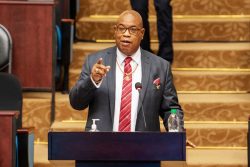The National Assembly yesterday morning passed the Petroleum Activities Bill 2023 whose main purpose is to provide for the exploration, production, storage, and transportation of petroleum in Guyana.
The Bill now replaces the Petroleum (Exploration and Production) Act of 1986.
Minister of Natural Resources, Vickram Bharrat in presenting the bill for second reading, stated, that it was no secret that Guyana’s oil and gas sector was moving at a rapid pace with the country’s discovery rate in exploration wells being unheard of around the world, “an 85% success rate of exploration well in deep water have never been heard of anywhere in the world whether it is deep sea or on land.”

Bharrat in providing a background on the petroleum sector reminded the National Assembly that oil was first discovered in Guyana in May 2015 with the first oil being produced from the Liza Destiny in December 2019..
“To date we have two FPSOs producing almost 400,000 barrels per day with a third FPSO being commissioned presently, the Prosperity, and set for production in the last quarter of 2023 which will take our daily production to over 600,000 barrels per day.”
According to Bharrat, it is estimated that by 2027 Guyana will be producing over 1 million barrels of oil per day.
As such noting the importance of the oil and gas sector, Bharrat said, “Mr. Speaker the oil and gas sector will continue to grow but we are faced with challenges too and as a result of that we must update the petroleum exploration and production act of 1986.”
Bharrat stressed that the 2023 bill will strengthen the current system in place, bring more accountability and transparency to the sector and “also bring a new dimension to the oil and gas sector as it continues to grow.”
According to the Bill, the Minister shall be res-ponsible for the administration of this Act, which responsibility shall include the general management of the petroleum resources of Guyana in accordance with this Act or any other written law.
Powers
Powers and duties of the Minister under the Bill, include the licensing of petroleum exploration, development, production, transportation, and storage operations, including the geological storage of carbon dioxide, the prescribing of subsidiary legislation, and the issuing of such guidelines as may be necessary for effectively carrying out the purpose of this Act, coordinating and cooperating with relevant agencies of the state regarding the environmental and safety aspects of petroleum operations, the monitoring of the conduct of petroleum operations to ensure compliance with this Act, and the terms and conditions of a license or permit granted, or a petroleum agreement entered into under this Act, and any other written law.
Additionally, the Minister will also be responsible for directing persons conducting petroleum operations to perform corrective actions where there is noncompliance with this Act and the terms and conditions of a license or permit granted, or petroleum agreement entered into, under this Act and any other written law, and imposing sanctions for non-compliance with this Act; developing terms of reference and prescribing qualification criteria for the grant of a license, giving licensees or holders of a permit directions as to any matter with respect to which regulations may be made under this Act, doing any and all things required by any direction given under section 17 and recovering such costs and expenses incurred for doing so in the same manner as revenues due to the State; directing that such studies and investigations, as the Minister deems fit, be done; and exercising any other powers required for the management of petroleum resources and operations carried out under this Act.
Further, the Minister shall, as soon as may be practicable after a license has been granted or renewed under this Act, publish a notice in the Gazette stating the name of the licensee and the coordinates of the area in respect of which the license has been granted.
Subject to section 78, the Minister shall assist the holder of a license under this Act to obtain ancillary rights required for the purpose of exercising the rights granted by the license or a petroleum agreement, which may include – a right to enter upon land and carry out petroleum operations, a right to use and occupy land for the construction of buildings, the installation and operation of production facilities, the laying and maintenance of pipelines and storage infrastructure and carrying out all other related works as may be required for the purpose of the license or petroleum agreement, a right to use water, and a right to build roads, bridges, or other enabling or preparatory infrastructure works as may be required for petroleum operations.
“Subject to subsidiary legislation made under this Act, the Minister may, by notice served on a licensee, give to the licensee any direction, consistent with best international industry standards and practices, as to any matter with respect to this Act and that direction shall be complied with within the time specified in the notice by the Minister or, where the time within which the direction shall be complied with is not specified, with all reasonable speed and as often as the occasion for such compliance arises.”
Liable
Notably, a licensee who fails or neglects, without reasonable cause, to comply with any direction given under subsection (1), shall be liable, on summary conviction, to a fine of five million dollars and in the case of a continuing offence, one million dollars a day for every day the offence continues.
Notwithstanding the conviction of a licensee under subsection (2), the Minister may cause to be done all or any of the things required by the direction given under subsection (1) to be done, and the costs and expenses incurred in doing so shall be recoverable by the Minister in the same manner as debts due to the State may be recovered.
Also, the Bill states that a government official or member of parliament, or a family member of a government official or member of parliament shall not acquire or hold any legal, equitable, or beneficial interest in a license granted under this Act.
Further, Bharrat during his presentation pointed out that the Bill includes a geological permit simply known as the “carbon capture and storage permit.”
He pointed out that most countries especially those that do not possess a forest like Guyana are already moving towards carbon capture and storage “even though it is a bit more expensive it is necessary and it is required.”
Absolute
APNU+AFC Parliamentarian Shurwayne Holder in his presentation stated the Bill gives absolute power to the minister, and according to him, perhaps the “most disappointing issue” of the bill is the absence of the National Petroleum Commission.
“There is absolutely no references to it. Mr. Speaker, the APNU+AFC share the view that our oil and gas sector should be insulated from politicization and as such the sector should be managed by a competent multi-disciplinary group which would comprise the petroleum commission.”
He said that the piece of legislation (bill) is what is expected to determine the way the country’s petroleum industry will be managed and governed for a significant period stressing that it comes at a time when Guyana is just about to approve new oil fields and merely weeks from an auction that will see agreements being made for exploration and production in fourteen new oil blocks.
“Mr Speaker, while the bill attempts to update our petroleum exploration and production laws the process at arriving where we are today unfortunately was not executed in the spirit of genuine inclusive democracy… This proposed bill consists of eighteen sections and ninety-eight clauses, some having multiple sub-clauses. For this government to lay this bill and attempt to ram it through the National Assembly via their one-seat majority demonstrates their unwillingness to work with the opposition in the best interest of the people and frankly speaking their contempt for all Guyanese. Further, Mr Speaker, it goes against the fundamental principle of transparency and democracy.”
Holder opined, that the Bill in its current form is grossly deficient and illustrates the “People’s Progressive Party’s thirst yet again for total domination and control.”
Four hundred times
According to Holder, the word Minister is mentioned in the bill over four hundred times in this bill. “There is an absolute over-concentration of power in the hands of the minister. I believe we understand fully as a nation what power does, especially in the petroleum industry, and how it corrupts governments, and its devastating impact on the country and its people.”
He continued, “The current Act which this bill seeks to repeal since it was passed into law over three decades ago provided for the minister to delegate responsibility to various public officers in areas of the Act which require technical assistance. Clause 3 for example, explicitly states that the minister may designate a public officer or any employee of GGMC as chief inspector. Mr. Speaker, this was done since 1986, the government at that time recognized that the governance structure of the oil and gas industry required some decisions to be made by technical experts and that those officers must be given an instrument of authority to be able to operate and make decisions without political interference.”
He added, that while this bill signals in Clause 3, delegation of power, it does not identify any of the officers nor their designations. “Further Mr. Speaker, it emphatically states in the very next clause, Clause 4, that notwithstanding any delegation, the minister may continue to exercise any power or perform any duty of the minister in accordance with the Act so the minister can override any officer that powers are delegated too, at any point.”
Holder further pointed out that the next two clauses go on to declare that any delegation or any act done in pursuance of that delegation is subject to review and variation by the minister and that the minister can revoke any delegation. “Mr. Speaker it is clear that if any delegation is made and those technical decisions do not see favour with the Minister, then he will change it unilaterally and or revoke those powers given to the technical officer. This is the definition of domination and control politics”, he said.
Touching on the lack of a National Petroleum Commission, Holder said, that his party just two years in office attempted to do just that through the Petroleum Commission Bill of 2017. “This bill sought to establish the petroleum commission to oversee and manage the oil and gas industry – to deal with compliance with policies, laws, and agreements; compliance with safety, health, and environmental standards, research safe, efficient, effective environmentally responsible exploration, optimum production methods, etc. It is the advisory body to the minister who in turn would be responsible for the policy direction.”
Meanwhile, following the debate, a motion was moved to have amendments presented to the National Assembly by APNU+AFC Member of Parliament, David Patterson form part of the bill. However, after it seemed that those voting against the amendments being included, were louder, Patterson called for a division allowing individual votes to be taken resulting in 28 voting for the amendments to be included, 33 against, and one declining to vote.
After the Speaker, Manzoor Nadir declared that the “amendments are defeated” the bill was eventually read for a third time and passed in the National Assembly as printed.







